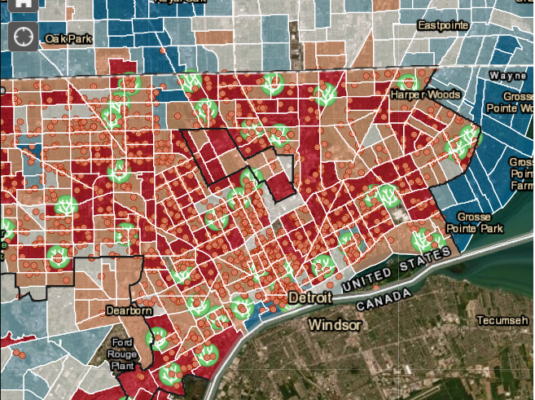
Sarah Burgard
Director, Population Studies Center; Professor of Sociology; Research Professor, Population Studies Center; Professor of Public Policy and Epidemiology (by courtesy)
Economic mobility refers to people’s ability to improve their economic status over the course of their lifetimes. Economic mobility requires access not only to income, assets, training, and employment, but also more intangible resources like power — the ability to make choices for yourself and influence others — and social inclusion, according to the U.S. Partnership on Mobility from Poverty.
It’s expensive to be poor, which limits economic mobility. Fines and fees add up when someone is unable to pay a full bill, and financial institutions often aim predatory products at low-income customers. A family living in poverty will struggle to afford basic household expenses like property taxes, auto insurance, internet access, and utility bills as well as necessities like food and health care.
Below is an overview of the numerous research projects supported by Poverty Solutions that aim to promote a better understanding of drivers of and barriers to economic mobility.
By Natasha Pilkauskas, Katherine Michelmore, and Nicole Kovski
Demography
By Robert Manduca, Catalina Anampa Castro, and Analidis Ochoa
Social Service Review
By Terri Friedline, Sofia Da Silva, and Ameya Pawar
By Terri Friedline and Ameya Pawar
By H. Luke Shaefer and Patrick Cooney
Trends in the Economic Well-Being of Households with Children (presentation)
By Patrick Cooney and H. Luke Shaefer
By Natasha Pilkauskas, Katherine Michelmore, and H. Luke Shaefer
by Natasha V. Pilkauskas, Katherine Michelmore, Nicole Kovski, and H. Luke Shaefer
By Alexandra K. Murphy, Karina McDonald-Lopez, Natasha Pilkauskas, and Alix Gould-Werth
Socius
Alexandra K. Murphy, Karina Lopez-MacDonald, Jamie Griffin, and Alix Gould-Werth
By Amanda Nothaft
By H. Luke Shaefer, Brian A. Jacob, Natasha V. Pilkauskas, Elizabeth Rhodes, and Katherine Richard
By Patrick Cooney, H. Luke Shaefer, and Samiul Jubaed
By Nicardo McInnis, Katherine Michelmore, and Natasha Pilkauskas
By Reuben Jonathan Miller
By Natasha Pilkauskas and Katherine Michelmore
By Amanda Nothaft and Patrick Cooney
By Alexandra K. Murphy, Alix Gould-Werth, and Jamie Griffin
Survey Practice
By Natasha Pilkauskas and Patrick Cooney
By Sara Hughes, Kathryn Maloney, Anna Kaczmarek, Heather Newberry, and Elizabeth Wallace
By Terri Friedline, Xanthippe Wedel, Natalie Peterson, and Ameya Pawar
By Poverty Solutions’ Detroit Partnership for Economic Mobility team
By Afton Branche-Wilson and Patrick Cooney
By Katherine Michelmore and Natasha V. Pilkauskas
By Terri Friedline, SeYoung Oh, Thomas Klemm, and Jase Kugiya
By Terri Friedline, Sruthi Naraharisetti, and Addie Weaver
Journal of Poverty
By Richard Rodems and H. Luke Shaefer
By Tony G. Reames, Ben Stacey, and Michael Zimmerman
By Stephanie S. Moore, Michael Gordon, Elise Gahan, and Julie Gowda
By Meghan O’Neil and J.J. Prescott
Law and Contemporary Problems
By Patrick Cooney, Elizabeth Phillips, and Joshua Rivera
By Tawanna R. Dillahunt and Xiang ‘Jacob’ Yan
By Xiang Yan, Xilei Zhao, Yuan Han, Pascal Van Hentenryck, and Tawanna Dillahunt
By H. Luke Shaefer, Kathryn Edin, Vincent Fusaro, and Pinghui Wu
By Taylor A. Begley, Umit G. Gurun, Amiyatosh Purnanandam, and Daniel Weagley
By William Elliott, Nicholas Sorensen, Megan O’Brien, Elizabeth Berland, and Briana Starks
By Sruthi Naraharisetti
By Dahlia Rockowitz, Chris Askew-Merwin, Malavika Sahai, Kely Markley, Cria Kay, and Tony Reames
By Alix Gould-Werth, Jamie Griffin, and Alexandra K. Murphy
Survey Practice
By Taylor A. Begley and Amiyatosh Purnanandam
Poverty Solutions partners with Michigan State University-Hurley Children’s Hospital Pediatric Public Health Initiative, GiveDirectly, and the Greater Flint Health Coalition to improve infant and maternal health, the economic and mental well-being of participants, and community-wide outcomes in the City of Flint, MI.


Science | Jan. 17, 2025

New York Times | Oct. 23, 2024

Washington Post | Sep. 10, 2024
Michigan has the most expensive auto insurance in the U.S., despite reforms passed in 2019 that significantly lowered premiums. Transportation is vitally important to economic mobility, and the price of auto insurance creates a huge barrier to automobile ownership in Michigan.